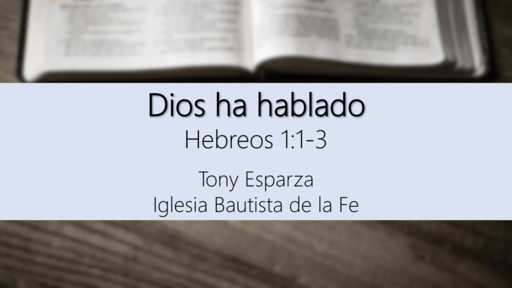Psalm 1:1-3
Sermon • Submitted • Presented
0 ratings
· 4 viewsNotes
Transcript
What Pleases God!
Lawrence Peter “Yogi” Berra is one of the greatest catchers of all time in Major League Baseball. Elected to the Baseball Hall of Fame in 1972, he was a fifteen-time all-star and a three-time American League MVP. He played in fourteen World Series with the New York Yankees, and he is a member of baseball’s All-Century Team. He also joined the Navy at age eighteen and participated in the D-Day invasion at Omaha Beach in World War II. Yogi Berra is deservedly known as a great baseball player, but he is equally known for his famous “Yogi-isms,” becoming one of the most quoted personalities of the twentieth century. Yogi Berra said,
• It ain’t over ’til it’s over.
• It’s like deja vu all over again.
• Never answer an anonymous letter.
• I usually take a two-hour nap from one to four.
And perhaps his best of all:
• When you come to a fork in the road, take it!
If you think about that last sentence, it has some truth. When you come to a fork in the road, you must take it. Life confronts us with many forks in the road:
• Where will I go to work
• Will I marry or remain single?
• Whom will I marry?
• Will we have children?
• How many children will we have?
• Will I put my faith in Jesus Christ as my Lord and Savior?
• When I die, will I go to heaven or hell?
These are important and significant questions; indeed, they are unavoidable forks in the road. Each of us faces different circumstances and situations that confront us with decisions we must make, with forks in the road. Thankfully, in Psalm 1 God gives us a road map that can guide us so that when we come to a fork in the road, we will choose the right road and the wise road.
In Psalm 1 we are confronted with two men, two roads, and two destinies.
Eugene Peterson gives a creative and colorful paraphrase of the psalm in The Message that will benefit our study:
How well God must like you—
you don’t walk in the ruts of those blind-as-bats,
you don’t stand with the good-for-nothings,
you don’t take your seat among the know-it-alls.
Instead you thrill to God’s Word,
you chew on Scripture day and night.
You’re a tree replanted in Eden,
bearing fresh fruit every month,
Never dropping a leaf,
always in blossom.
It is a wisdom psalm reminiscent of the wisdom of Proverbs as it draws a contrast between two men, two approaches to life, two roads to travel, and two destinies. One way is the blessed road of those who follow God. The other is the tragic road of those who follow the ways of the wicked, the sinners, and the mockers.
Wisdom is as much about knowing when to say no as it is when to say yes.
Kenny Rogers,
“You've got to know when to hold 'em
Know when to fold 'em
Know when to walk away
And know when to run…”
Don’t walk with the wicked.
The word happy (ESV, “Blessed”) describes a rewarding and fulfilling life. What kind of person lives the blessed, rewarding, and meaningful life?
First, the psalmist warns us not to follow “the advice of the wicked,” who are mentioned four times in Psalm 1. Whom you follow will inevitably shape your conduct. It is difficult to avoid imitating and becoming like those we walk with daily.
As Calvin wisely says, “By little and little, men are ordinarily induced to turn aside from the right path”
Following the advice of the wicked starts with simple association with people for whom the things of God matter little, if at all. Be careful where you go.
Do you remember the song, “Be careful little eyes what you see, (feet where you go)…”
Be wise about the people you listen to. Not all advice is good advice. Don’t walk in the counsel of the ungodly.
2. Don’t stand with sinners.
The phrase stand in the way conveys the idea of staying a while, stopping to look and listen, and hanging around or hanging out with.
The word way describes a manner of life, the way one lives. “Sinners” are those who miss God’s mark. They are in the habit of standing on the opposite side from God. Instead of taking a stand for God, they take their stand with those who oppose him.
Their way of life is more important than Christ’s way of life. Sin becomes their pattern, and sinners become their partners. Instead of wisely imitating Christ, the ultimate blessed man (1 Cor 11:1), they foolishly imitate sinners.
3. Don’t sit with fools.
Finally, the psalmist warns us not to throw our lot in with or “sit in the company of mockers.” The action from walking to sitting describes moving from thinking like the wicked to living like the rebellious and to ridiculing like the cynic.
If we walk in the advice of the wicked, this way of life is now our home. This is where we sit. We are comfortable here. Not only do the things of God not matter, but we mock as fools those who think the things of God do matter.
“Mockers” or “scoffers” describes the self-sufficient who pridefully say, “I don’t need God; I will live my life my way.”
When to Say Yes
Say yes to God’s Word (v. 2). We should “delight” in the “LORD’s instruction.” We should take joy and find pleasure in the Word of God. We should be people who love the Bible. It is a joy, not a burden, to learn it and to live it.
Spurgeon says, “ ‘The [instruction] of the Lord’ is the daily bread of the true believer”
Say yes to God’s wisdom (v. 2). The person who delights in the Word of God “meditates on it day and night.” To meditate means “to think over something by talking to oneself.” He or she carefully and continually ponders and weighs the Scriptures. Joshua 1:8 reminds us,
This book of instruction must not depart from your mouth; you are to meditate on it day and night so that you may carefully observe everything written in it. For then you will prosper and succeed in whatever you do.
Here is the person who is preoccupied and consumed with the Word of God. It is his priority; it is her passion. We should ask ourselves some of these questions regularly:
• What do I think about when I daydream?
• What do I sing about when I take a drive or go on a walk?
• What comes to my mind and fills my heart when tragedy strikes and disappointment comes?
• In a 24-hour day, 10,080-minute week, 2,592,000-second month, how much time do I give to memorizing and meditating on God’s Word?
What we love, we will spend time with.
Say yes to God’s will (v. 3).
Romans 12:2 says God’s will is “good, pleasing, and perfect.” The psalmist says God’s will is fruitful and prosperous.
The people who live this life trust God to plant them! They trust God to make them prosper.
These are happy people because the road they travel pleases God.
What then does a spiritually prosperous life look like?
To answer, we can restate verse 1. Such a person walks in the advice of the godly, he stands in the pathway of the righteous, and he sits in the company of the hopeful.
He studies the Word.
He acts with wisdom.
He is devoted to God’s will.
This life is the truly prosperous life.
ADVERTISEMENT
Related Media
See moreRelated Sermons
See more

Tony Esparza • 28 views • 48:03


Faith Community Bible Church • 6 views • 1:05:10


Gosnells Baptist Church • 35 views • 31:18



